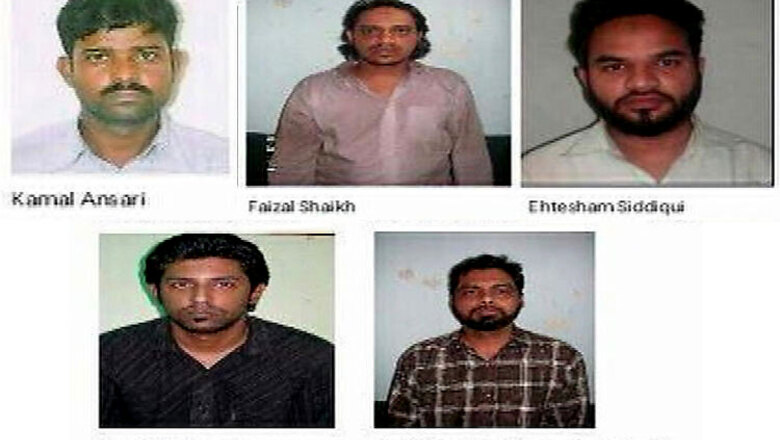
views
Mumbai: The MCOCA court on Wednesday sentenced five of the 12 convicts to death in the serial bombs blasts in Mumbai local trains in 2006 in which 188 people were killed. The five convict who have been given death sentence are bomb planters Kamal Ahamed Ansari (37), Mohd Faisal Shaikh (36), Ehtesham Siddiqui (30), Naved Hussain Khan (30) and Asif Khan (38).
The convicts' lawyers said that they will move the Bombay High Court against the order.
Gulzar Azmi, Secretary of Jamiat-e-Ulema, who is legally supporting convicts said, "We are confident that justice will be done in the High Court. The real culprits are not caught and innocent are been charged. Many times High Court has overturned the lower courts order and deliver justice."
Seven other convicts have been sentenced to life. The seven convicts are Tanvir Ahmed Ansari (37), Mohammad Majid Shafi (32), Shaikh Alam Shaikh (41), Mohd Sajid Ansari (34), Muzzammil Shaikh (27), Soheil Mehmood Shaikh (43), Zamir Ahmad Shaikh (36).
Meanwhile, convict Ehteshaam Siddique has written to Home Minister Rajnath Singh claiming innocence.
Earlier, on September 11, it had convicted 12 of the 13 accused, all allegedly having links with banned SIMI, while acquitting one.
Reacting to the judgement, former ATS chief KP Raghuvanshi "My team which carried out investigation stands vindicated. I hope this brings some closure to families of the victims. We are satisfied that court has given the important order that ATS had investigated the case in the right direction."
Prosecution had demanded death penalty for 8 of the 12 accused while it sought life imprisonment for the remaining four in the MCOCA court of Special Judge Yatin D Shinde.
The accused were found guilty of several charges under IPC, Explosives Act, Unlawful Activities Prevention Act, Prevention of Damage to Public Property Act and Indian Railway Act and those under MCOCA.
The chargesheet filed by Anti Terrorism Squad (ATS) in November 2006 had named 30 accused, out of which 17 are still absconding. The absconding accused comprise 13 Pakistan nationals, include Azam Cheema, an alleged Lashker-e-Toiba member.
The ATS chargesheet had said that Improvised Explosive Devices (IEDs) were made in a room in Govandi in suburban Mumbai and some Pakistani nationals were also present during the bomb-making.
Seven RDX bombs had exploded in the first class coaches in many suburban trains on July 11, 2006, killing 188 people and injuring 829.
In the trial that ran for eight long years, the prosecution examined 192 witnesses, including eight Indian Police Service (IPS) and five Indian Administrative Service (IAS) officers as well as 18 doctors. The defence lawyers examined 51 witnesses and one person was called as a court witness.
The blast occurred within a span of 10 minutes between Khar Road-Santacruz, Bandra-Khar Road, Jogeshwari-Mahim Junction, Mira Road- Bhayander, Matunga- Mahim Junction and Borivali.
The MCOCA judge had concluded the trial on August 19, 2014. The examination of witnesses resumed after two years since the Supreme Court had stayed the trial in 2008.
Before the stay, the prosecution had already examined a police officer. The Supreme Court vacated the stay on April 23, 2010. Of the 13 accused arrested by ATS between July 20, 2006 and October 3, 2006, 11 had given statements admitting to their involvement in the blasts but later retracted.
The case took a twist when the defence lawyer sought to call Indian Mujahideen co-founder Sadiq Sheikh as defence witness after he told the police in 2008 that IM members were responsible for all the blasts that happened since 2005 including the train blasts.
The court had allowed to examine Sadiq as a defence witness who later claimed that he gave his confession under duress.















Comments
0 comment